- Home
- Gregory Maguire
Wicked: The Life and Times of the Wicked Witch of the West Page 9
Wicked: The Life and Times of the Wicked Witch of the West Read online
Page 9
“What a fascinating condition,” said Madame Morrible. “And how vexing for you, really.”
“I couldn’t have allowed her to accept responsibility for fourteen other girls,” Galinda confided. “For me, alone, there is no problem. I love the foolish old woman, in a way.”
Madame Morrible had said, “But what of your roomie? Can you jeopardize her well-being?”
“I didn’t ask for her.” Galinda looked the Head in her glazed, unblinking eye. “The poor Munchkinlander appears to be used to a life of distress. Either she will adjust or, I assume, she will petition you to be removed from my room. Unless, of course, you feel it your duty to move her for her own safety.”
Madame Morrible said, “I suppose if Miss Elphaba cannot live with what we give her, she will leave Crage Hall on her own accord. Don’t you think?”
It was the we in what we give her: Madame Morrible was binding Galinda into a campaign. They both knew it. Galinda struggled to maintain her autonomy. But she was only seventeen, and she had suffered that same indignity of exclusion in the Main Hall just hours ago. She didn’t know what Madame Morrible could have against Elphaba except the looks of her. But there was something, there was clearly something. What was it? She sensed it to be wrong somehow. “Don’t you think, dear?” said Madame Morrible, bowing a bit forward like a fish arching in a slow-motion leap.
“Well, of course, we must do what we can,” said Galinda, as vaguely as possible. But she seemed the fish, and caught on a most clever hook.
Out of the shadows of the reception room came a small tiktok thing, about three feet high, made of burnished bronze, with an identifying plate screwed into its front. The plate said Smith and Tinker’s Mechanical Man, in ornate script. The clockwork servant collected the empty teacups and whirred itself away. Galinda didn’t know how long it had been there, or what it had heard, but she had never liked tiktok creatures.
Elphaba had a bad case of what Galinda called the reading sulks. Elphaba didn’t curl up—she was too bony to curl—but she jackknifed herself nearer to herself, her funny pointed green nose poking in the moldy leaves of a book. She played with her hair while she read, coiling it up and down around fingers so thin and twiglike as to seem almost exoskeletal. Her hair never curled no matter how often Elphaba twined it around her hands. It was beautiful hair, in an odd, awful way, with a shine like the pelt of a healthy giltebeest. Black silk. Coffee spun into threads. Night rain. Galinda, not given to metaphor on the whole, found Elphaba’s hair entrancing, the more so because the girl was otherwise so ugly.
They didn’t talk much. Galinda was too busy forging alliances with the better girls who had been her rightful roomie prospects. No doubt she could switch rooms at half-term, or at any rate next fall. So Galinda left Elphaba alone, and she flew down the hall to gossip with her new friends. Milla, Pfannee, Shenshen. Just as in children’s books about boarding school, each new friend was wealthier than the one before.
At first Galinda didn’t mention who her roomie was. And Elphaba showed no sign of expecting Galinda’s company, which was a relief. But the gossip had to start sooner or later. The first wave of discussion about Elphaba concerned her wardrobe and her evident poverty, as if her classmates were above noticing her sickly and sickening color. “Someone told me that Madame Head had said Miss Elphaba was the Thropp Third Descending from Nest Hardings,” said Pfannee, who was also a Munch-kinlander, but one of diminutive stock, not full-size like the Thropp family. “The Thropps are highly regarded in Nest Hardings and even beyond. The Eminent Thropp put together the area’s militia and tore up the Yellow Brick Road that the Ozma Regent had been laying in when we all were small—before the Glorious Revolution. There was no callousness in the Eminent Thropp or his wife or family, including his granddaughter Melena, you can be assured.” By callousness, of course, Pfannee meant greenness.
“But how the mighty have fallen! She’s as ragged as a gypsy,” observed Milla. “Have you ever seen such tawdry dresses? Her Ama should be sacked.”
“She has no Ama, I think,” said Shenshen. Galinda, who knew for sure, said nothing.
“They said she had spent time in Quadling Country,” Milla went on. “Perhaps her family had been exiled as criminals?”
“Or they were speculators in rubies,” said Shenshen.
“Then where’s the wealth?” snapped Milla. “Speculators in rubies did very well, Miss Shenshen. Our Miss Elphaba doesn’t have two barter tokens to rub together and call her own.”
“Perhaps it’s a kind of religious calling? A chosen poverty?” suggested Pfannee, and at this nonsense they all threw back their heads and chortled.
Elphaba, coming into the buttery for a cup of coffee, caused them to escalate into louder roars of laughter. Elphaba did not look over at them, but every other student did glance their way, each girl longing to be included in the jollity, which made the four new friends feel just fine.
Galinda was slow coming to terms with actual learning. She had considered her admission into Shiz University as a sort of testimony to her brilliance, and believed that she would adorn the halls of learning with her beauty and occasional clever sayings. She supposed, glumly, that she had meant to be a sort of living marble bust: This is Youthful Intelligence; admire Her. Isn’t She lovely?
It hadn’t actually dawned on Galinda that there was more to learn, and furthermore that she was expected to do it. The education all the new girls chiefly wanted, of course, had nothing to do with Madame Morrible or the prattling Animals at lecterns and on daises. What the girls wanted wasn’t equations, or quotations, or orations—they wanted Shiz itself. City life. The broad, offensive panoply of life and Life, seamlessly intertwined.
Galinda was relieved that Elphaba never took part in the outings the Amas organized. Since they often stopped at a lunchroom for a modest meal, the weekly brigade became known informally as the Chowder and Marching Society. The university district was aflame with autumn color, not just of dying leaves, but also of fraternity pennants, fluttering from rooftop and spire.
Galinda soaked up the architecture of Shiz. Here and there, mostly in protected College yards and side streets, the oldest surviving domestic architecture still leaned, ancient wattle-and-daub and exposed stud framing held up like paralytic grannies by stronger, newer relatives on either side. Then, in dizzying succession, unparalleled glories: Bloodstone Medieval, Merthic (both Least and the more fantastical Late), Gallantine with its symmetries and restraint, Gallantine Reformed with all those festering ogees and broken pediments, Bluestone Revival, Imperial Bombast, and Industrial Modern, or, as the critics in the liberal press put it, High Hostile Crudstyle, the form propagated by the modernity-minded Wizard of Oz.
Besides architecture, the excitement was tame, to be sure. On one notable occasion, which no Crage Hall girl present ever forgot, the senior boys from Three Queens College across the canal, for a lark and a dare, had tanked themselves up with beer in the middle of the afternoon, had hired a White Bear violinist, and had gone down to dance together under the willow trees, wearing nothing but their clinging cotton drawers and their school scarves. It was deliciously pagan, as they had set an old chipped statue of Lurline the Fairy Queen on a three-legged stool, and she seemed to smile at their loose-limbed gaiety. The girls and the Amas pretended shock, but poorly; they lingered, watching, until horrified proctors from Three Queens came rushing out to round the revelers up. Near nudity was one thing, but public Lurlinism—even as a joke—bordered on being intolerably retrograde, even royalist. And that did not do in the Wizard’s reign.
One Saturday evening, when the Amas had a rare night off and had taken themselves in to a pleasure faith meeting in Ticknor Circus, Galinda had a brief and silly squabble with Pfannee and Shenshen, after which she retired early to her bedchamber, complaining of a headache. Elphaba was sitting up in her bed with the commissary brown blanket tucked around her. She was hunched forward over a book, as usual, and her hair hung down like brackets on either s
ide of her face. She looked to Galinda like one of those etchings—the natural history books were full of them—of odd Winkie mountain women who hide their strangeness with a shawl over the head. Elphaba was munching on the pips of an apple, having eaten all the rest of it. “Well, you look cozy enough, Miss Elphaba,” said Galinda, challengingly. In three months it was the first social remark she had managed to make to her roomie.
“Looks are only looks,” said Elphaba, not looking up.
“Will it break your concentration if I sit in front of the fire?”
“You cast a shadow if you sit just there.”
“Oh, sorry,” said Galinda, and moved. “Mustn’t cast shadows, must we, when urgent words are waiting to be read?”
Elphaba was back in her book already, and didn’t answer.
“What the dickens are you reading, night and day?”
It seemed as if Elphaba were coming up for air from a still, isolated pool. “While I don’t read the same thing every day, you know, tonight I am reading some of the speeches of the early unionist fathers.”
“Why ever would anyone want to do that?”
“I don’t know. I don’t even know if I want to read them. I’m just reading them.”
“But why? Miss Elphaba the Delirious, why, why?”
Elphaba looked up at Galinda and smiled. “Elphaba the Delirious. I like it.”
Before she had a chance to bite it back, Galinda returned the smile, and at the same time a sweeping wind sent a handful of hail against the glass, and the latch broke. Galinda leaped to swing the casement shut, but Elphaba scuttled to the far corner of the room, away from the wet. “Give me the leather luggage grip, Miss Elphaba, from inside my satchel—there on the shelf, behind the hatboxes—yes—and I’ll secure this until we can get the porter to fix it tomorrow.” Elphaba found the strap, but in doing so the hat boxes tumbled down, and three colorful hats rolled out onto the cold floor. While Galinda scrabbled up on a chair to organize the window shut again, Elphaba returned the hats to their boxes. “Oh, try it on, try that one on,” said Galinda. She meant to have something to laugh at, to tell Misses Pfannee and Shenshen about and so to work her way back into their good graces.
“Oh, I daren’t, Miss Galinda,” Elphaba said, and went to set the hat away.
“No, do, I insist,” Galinda said, “for a lark. I’ve never seen you in something pretty.”
“I don’t wear pretty things.”
“What’s the harm?” said Galinda. “Just here. No one else need see you.”
Elphaba stood facing the fire, but turned her head on her shoulders to look long and unblinkingly at Galinda, who had not yet hopped down from the chair. The Munchkinlander was in her nightgown, a drab sack without benefit of lace edging or piping. The green face above the wheat-gray fabric seemed almost to glow, and the glorious long straight black hair fell right over where breasts should be if she would ever reveal any evidence that she possessed them. Elphaba looked like something between an animal and an Animal, like something more than life but not quite Life. There was an expectancy but no intuition, was that it?—like a child who has never remembered having a dream being told to have sweet dreams. You’d almost call it unrefined, but not in a social sense—more in a sense of nature not having done its full job with Elphaba, not quite having managed to make her enough like herself.
“Oh, put the damn hat on, really,” said Galinda, for whom, where introspection was concerned, enough was enough.
Elphaba obliged. The thing was the lovely roundel bought from the best milliner in the Pertha Hills. It had orangey swags and a yellow lace net that could be draped to achieve varying degrees of disguise. On the wrong head it would look ghastly, and Galinda expected to have to bite the inside of her lip to keep from laughing. It was the kind of superfeminine thing boys in a pantomime wore when they pretended to be girls.
But Elphaba dropped the whole sugary plate onto her strange pointed head, and looked at Galinda again from underneath the broad brim. She seemed like a rare flower, her skin stemlike in its soft pearlescent sheen, the hat a botanical riot. “Oh Miss Elphaba,” said Galinda, “you terrible mean thing, you’re pretty.”
“Oh, and now you have lied, so go confess to the unionist minister,” said Elphaba. “Is there a looking glass?”
“Of course there is, down the hall in the lavatory.”
“Not there. I’m not going to be seen by those ninnies in this.”
“Well then,” decided Galinda, “can you find an angle without hiding the firelight, and look at your reflection in the dark window?”
They both gazed at the green and flowery spectre reflected in the watery old glass, surrounded by the blackness, driven through with the wild rain beyond. A maplefruit leaf, shaped like a star with blunted points, or like a heart grown lopsided, suddenly whirled out of the night and plastered itself on the reflection in the glass, gleaming red and reflecting the firelight, just where the heart would be—or so it seemed from the angle at which Galinda stood.
“Entrancing,” she said. “There’s some strange exotic quality of beauty about you. I never thought.”
“Surprise,” said Elphaba, and then nearly blushed, if darker green constituted a blush—“I mean, surprise, not beauty. It’s just surprise. ‘Well, what do you know.’ It’s not beauty.”
“Who am I to argue,” said Galinda, tossing her curls and striking a pose, and Elphaba actually laughed at that, and Galinda laughed back, partly horrified as she did so. Elphaba tore the hat off then, and returned it to its box, and when she picked up her book again Galinda said, “So what is Beauty reading anyway? I mean really, tell me, why the old sermons?”
“My father is a unionist minister,” said Elphaba. “I’m just curious what it’s all about, that’s all.”
“Why don’t you just ask him?”
Elphaba didn’t answer. Her face took on a solid, waiting look, like that of an owl just about to go for a mouse.
“So what’re they on about? Anything interesting?” said Galinda. No sense giving up now, there was nothing else to do and she was too wrought up by the storm to sleep.
“This one is thinking about good and evil,” said Elphaba. “Whether they really exist at all.”
“Oh, yawn,” said Galinda. “Evil exists, I know that, and its name is Boredom, and ministers are the guiltiest crew of all.”
“You don’t really think that?”
Galinda didn’t often stop to consider whether she believed in what she said or not; the whole point of conversation was flow. “Well, I didn’t mean to insult your father, for all I know he is an entertaining and lively preacher.”
“No, I mean do you think evil really exists?”
“Well, how do I know what I think?”
“Well, ask yourself, Miss Galinda. Does evil exist?”
“I don’t know. You say. Does evil exist?”
“I don’t expect to know.” The look went slanty and inwards somehow, or was it the hair swinging forward like a veil again?
“Why don’t you just ask your father? I don’t understand. He should know, that’s his job.”
“My father taught me a lot,” Elphaba said slowly. “He was very well educated indeed. He taught me to read and write and think, and more. But not enough. I just think, like our teachers here, that if ministers are effective, they’re good at asking questions to get you to think. I don’t think they’re supposed to have the answers. Not necessarily.”
“Oh, well, tell that to our boring minister at home. He has all the answers, and charges for them, too.”
“But maybe there’s something to what you say,” said Elphaba. “I mean, evil and boredom. Evil and ennui. Evil and the lack of stimulation. Evil and sluggish blood.”
“You’re writing a poem, it sounds like. Why ever would a girl be interested in evil?”
“I’m not interested in it. It’s just what the early sermons are all on about. So I’m thinking about what they’re thinking about, that’s all. Some
times they talk about diet and not eating Animals, and then I think of that. I just like to think about what I’m reading. Don’t you?”
“I don’t read very well. So I don’t think I think very well either.” Galinda smiled. “I dress to kill, though.”
There was no response from Elphaba. Galinda, usually pleased that she knew the correct way to steer every conversation into a paean to herself, was flummoxed. She lamely ventured on, annoyed at having to expend the effort. “Well, whatever did those old brutes think about evil, then?”
“It’s hard to say exactly. They seemed to be obsessed with locating it somewhere. I mean, an evil spring in the mountains, an evil smoke, evil blood in the veins going from parent to child. They were sort of like the early explorers of Oz, except the maps they made were of invisible stuff, pretty inconsistent one with the other.”
“And where is evil located?” Galinda asked, flopping onto her bed and closing her eyes.
“Well, they didn’t agree, did they? Or else what would they have to write sermons arguing about? Some said the original evil was the vacuum caused by the Fairy Queen Lurline leaving us alone here. When goodness removes itself, the space it occupies corrodes and becomes evil, and maybe splits apart and multiplies. So every evil thing is a sign of the absence of deity.”
“Well I wouldn’t know an evil thing if it fell on me,” said Galinda.
“The early unionists, who were a lot more Lurlinist than unionists are today, argued that some invisible pocket of corruption was floating around the neighborhood, a direct descendent of the pain the world felt when Lurline left. Like a patch of cold air on a warm still night. A perfectly agreeable soul might march through it and become infected, and then go and kill a neighbor. But then was it your fault if you walked through a patch of badness? If you couldn’t see it? There wasn’t ever any council of unionists that decided it one way or the other, and nowadays so many people don’t even believe in Lurline.”

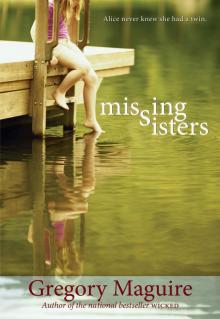 Missing Sisters
Missing Sisters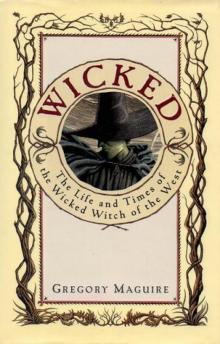 Wicked: The Life and Times of the Wicked Witch of the West
Wicked: The Life and Times of the Wicked Witch of the West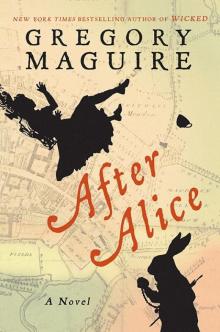 After Alice
After Alice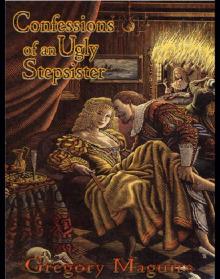 Confessions of an Ugly Stepsister
Confessions of an Ugly Stepsister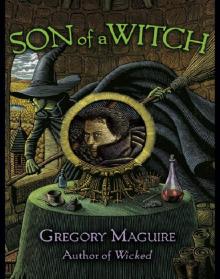 Son of a Witch
Son of a Witch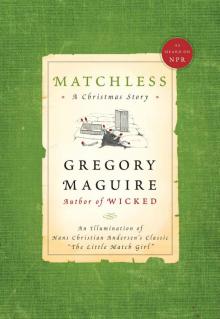 Matchless
Matchless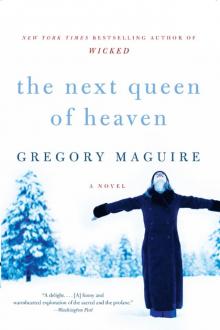 The Next Queen of Heaven
The Next Queen of Heaven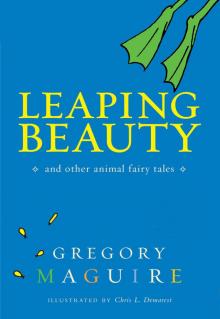 Leaping Beauty: And Other Animal Fairy Tales
Leaping Beauty: And Other Animal Fairy Tales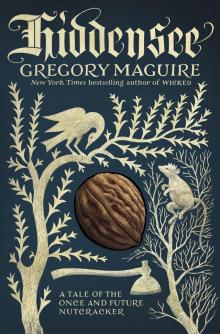 Hiddensee: A Tale of the Once and Future Nutcracker
Hiddensee: A Tale of the Once and Future Nutcracker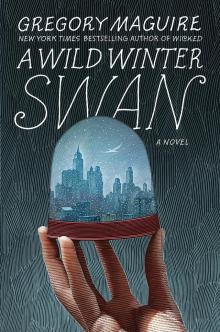 A Wild Winter Swan
A Wild Winter Swan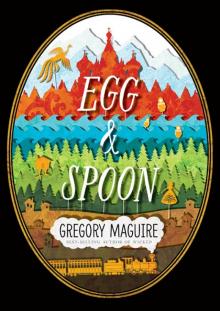 Egg & Spoon
Egg & Spoon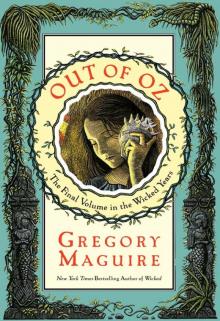 Out of Oz
Out of Oz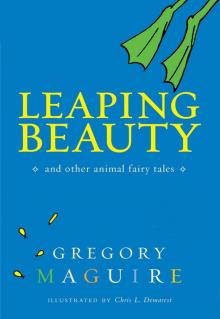 Leaping Beauty
Leaping Beauty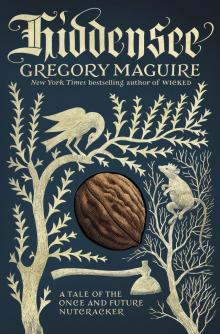 Hiddensee
Hiddensee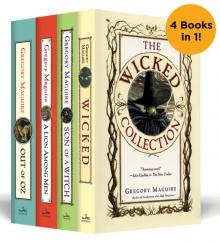 The Wicked Years Complete Collection
The Wicked Years Complete Collection The Next Queen of Heaven: A Novel
The Next Queen of Heaven: A Novel